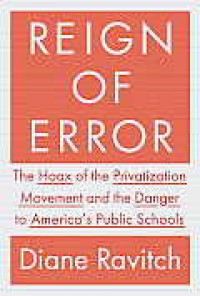Clif's Book World
Adventures from reading books captured within short reviews.
Reign of Error: The Hoax of the Privatization Movement and the Danger to America's Public Schools by Diane Ravitch

This is the best defense of public schools I've come across. Americans who have not read this book are probably insufficiently informed to vote wisely in local and state elections.
Contrary to what one might conclude from media reports, levels of educational achievement and graduation rates in the United States have been consistently rising over the years. Surprise! Achievement scores are now “at their highest point ever recorded.” Achievement has been going up for all racial groups, but the gaps between the groups persist. (It is interesting to note that current age 9 average math score for blacks is now equal to what the age 9 math score was for whites in 1982, but the gap continues because scores for whites have gone up.) LINK to NAEP Report
But supporters of charter and on-line schools point out that many other countries have higher levels of educational achievement, and their proposed solutions are needed to catch up. It’s interesting to note that these other countries achieve their educational success without the use of charter schools, virtual on-line schools, and punitive threats of firing teachers and closing schools.
Ravitch provides a comparative look at Finland which consistently scores high on educational achievement tests. She shows that they obtain their success by respecting their teachers as professionals, and their students don’t take standardized tests until it's time to enter college. How does Finland do it? There is one very significant difference between Finland and the United States. Finland has a much smaller percentage of students living in poverty (3%) compared to the United States (20%). It just so happens that the family wealth/poverty level is a significant indicator of probable academic success. No charter or virtual on-line school has been able to overcome the effects of poverty and segregation for their average achievement scores when they’re required to accept the same students as public schools.
Some promoters of charter schools criticize public schools for using poverty is an excuse. But experience has shown that charters are quick to use it as an excuse when they fail to perform any better. In case you think on-line computer classes are the answer you need to read this article.
Ravitch doesn't have much good to say about standarized tests, "No Child Left Behind" or "Race to the Top." She has plenty of criticism for both Democrats and Republicans. And she very critically lays into some of the well-known private-sector leaders and political officials — among them Arne Duncan, Joel Klein, Bill Gates, Wendy Kopp and Michelle Rhee. The scary thing about the private for-profit charter school chains is that they are now a formidable political lobby group with lots of campaign contributions for friendly politicians. They're not going away anytime soon.
Ravitch acknowledges that her previous books were criticized for being long on criticism and short on suggestions of ways to improve the American educational system. She says the solution is simple. Just look at what wealthy private schools and public schools in the wealthy suburbs are doing. Their test scores compare well with international comparisons. In order to duplicate in all schools what they are doing will require providing good prenatal care. Then there should be vastly expanded prekindergarten programs, more comprehensive medical and mental health provisions, smaller classes, and diagnostic testing that, unlike a standardized exam, show us where a child needs specific help. Ravitch says we should honor the teaching profession by strengthening the profession with higher entry standards. She doesn't think that answer is in recruiting "enthusiastic amateurs" who teach short term and move on to other professions.
She describes stick-and-carrot incentives such as merit pay as "the idea that never works and never dies." She says such incentives undermine the spirit of collaboration by pitting teachers against each other. She also deplores humiliating practices such as publishing teachers' names beside students' test scores. She tells of one teacher publicly humiliated as the "worst teacher in New York" when all teacher scores were published. After news reporters circled her house hounding her for interviews it was revealed that she taught a class of English language learners who moved on to regular classes when they were able. It's obvious not all students are equally teachable. Tying pay to student performance will provide a strong disincentive for teaching disadvantaged students, or teaching students who are already at the high end of achievement levels with little room for improvement.
This "Children as Blueberries" story is reference by this book. If you haven't heard the story it's worth reading.
I hope this book is a best seller and widely read. I hope it puts a nail into the coffin of the for profit privatization movement in education. I hope it also increases the willingness of voters to support spending on public schools, and providing the other services and changes that Ravitch recommends to equalize access to good education.
 1
1


